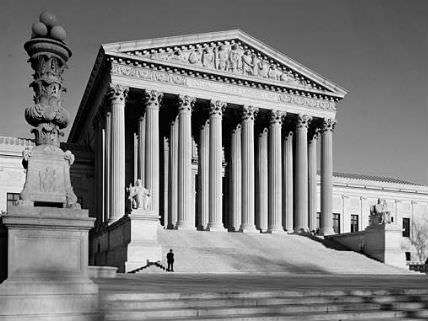Today at SCOTUS: Traffic Stops, Drug-Sniffing Dogs, and Unreasonable Searches and Seizures
When does the use of a drug-sniffing dog transform a lawful traffic stop into an illegal seizure?

The Fourth Amendment to the U.S. Constitution secures the right of the people to be free from unreasonable searches and seizures. Yet in its 2005 decision in Illinois v. Caballes, the U.S. Supreme Court allowed the police to use a drug-sniffing dog without a search warrant during a routine traffic stop. Why? Because "a dog sniff conducted during a concededly lawful traffic stop that reveals no information other than the location of a substance that no individual has any right to possess does not violate the Fourth Amendment." So long as the traffic stop is not "unnecessarily prolonged" by the use of the drug dog, the Court said, no constitutional harm has been done. But if the stop "is prolonged beyond the time reasonably required to complete that mission," the Court added, the seizure "can become unlawful."
But how much prolonging counts as too much prolonging? At what point in time does the use of a drug-sniffing dog transform a lawful stop into an illegal seizure? During oral argument today in the case of Rodriquez v. United States, the Supreme Court grappled with those questions.
The case arose in 2012 when a Nebraska police officer, who happened to have his K-9 dog in the car with him, stopped Dennys Rodriguez for swerving once towards the shoulder of the road. After questioning Rodriguez and issuing him a written warning for that traffic infraction, the officer sought permission to walk his drug-sniffing dog around the outside of Rodriguez's vehicle. When Rodriguez refused to grant permission, the officer made him exit the vehicle and waited for back-up to arrive. Roughly eight minutes later, with a second officer now on the scene for support, the police dog circled the vehicle and gave an "alert" for illegal drugs. A subsequent search turned up a bag of methamphetamine.
Today's oral argument centered on whether those eight extra minutes "unnecessarily prolonged" the otherwise legal traffic stop and thereby violated Rodriquez's constitutional rights.
Representing Dennys Rodiguez before the Court was Shannon P. O'Connor, a Nebraska public defender. He urged the justices to adopt a bright-line rule in favor of his client. "Once the stop is finished, then he should be allowed to go no matter what the [police officer's] question was," O'Connor asserted.
But several members of the Court quickly rejected O'Connor's stance.
"If we hold that it's okay to have a dog sniff so long as it's before the ticket is issued," observed Justice Samuel Alito, "then every police officer other than those who are uniformed or incompetent will delay the handing over of the ticket until the dog sniff is completed. So what has that—what does that accomplish?"
Justice Ruth Bader Ginsburg voiced a similar objection. That sounds like "the easiest thing to get around," she told O'Connor. "The police can just say, I'm going to defer that [ticket] a few minutes until the dog sniff occurs. It just seems to me that you're not going to accomplish any protection for individuals if that's your position."
A few minutes later, Justice Department lawyer Ginger Anders took to the lectern in defense of the Nebraska police. "Just because a dog sniff prolongs the traffic stop by some, you know, incremental amount of time doesn't mean that the stop is per se unreasonable," she told the Court.
But that argument was soon called into doubt by Justice Elena Kagan. "You're saying Caballes gives you this extra leeway to detain people even though it is longer than an ordinary traffic stop would take, and I think that's just not right," Kagan told Anders. "It's not some kind of extra leeway for the police officers to do things outside the bounds of the traffic stop itself."
Justice Sonia Sotomayor, meanwhile, raised a more fundamental objection to the federal government's case. "We can't keep bending the Fourth Amendment to the resources of law enforcement," Sotomayor declared. "Particularly when this stop is not incidental to the purpose of the stop. It's purely to help the police get more criminals, yes. But then the Fourth Amendment becomes a useless piece of paper."
Anders, however, refused to budge. "Well," she said, "we think there is a law enforcement interest in officers having some leeway to sequence the stop as they see fit."
A decision in Rodriguez v. United States is expected by June 2015.


Show Comments (17)